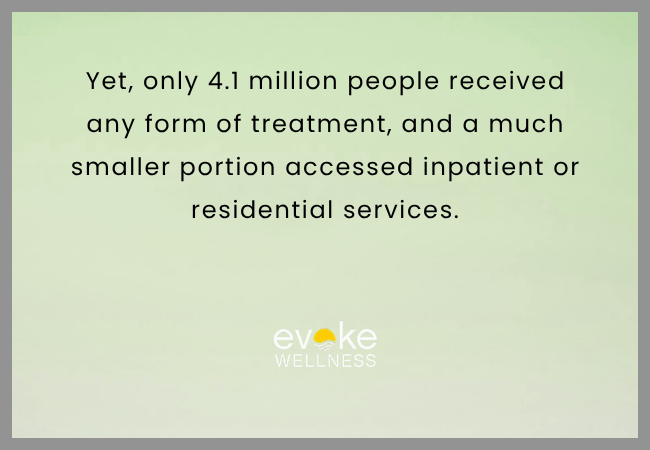Understanding the nuances between different levels of addiction treatment can be overwhelming, especially when terms like “residential rehab” and “inpatient rehab” are often used interchangeably. While both options provide intensive support and structure to individuals battling substance use disorders and co-occurring mental health challenges, the distinction between residential and inpatient rehab programs lies in the specific treatment setting, duration, and focus. For anyone considering treatment, knowing these differences can empower better decision-making for long-term recovery.
At Evoke Wellness at Cohasset, we specialize in offering comprehensive programs that cater to the unique needs of each individual, ensuring the highest quality of care in a supportive environment. This article will clarify what sets residential rehab apart from inpatient rehab and help you understand which might be the best fit on your journey to healing.
Defining Residential Rehab and Its Core Components
Residential rehab is often described as a residential treatment center in Massachusetts where individuals live full-time for a period ranging from a few weeks to several months. The core purpose of residential programs is to immerse patients in a safe, structured environment removed from triggers and stresses of everyday life. This extended stay allows clients to engage in holistic therapies, build new coping skills, and form a sober community.
In a residential rehab, patients typically have 24/7 access to care providers including counselors, therapists, and medical staff. Beyond addiction treatment, there is significant emphasis on addressing underlying mental health disorders, trauma, and behavioral health challenges. This integrated care approach helps promote long-term wellness by treating the whole person rather than just the addiction.
Residential programs offer a variety of therapeutic modalities such as group therapy, individual counseling, family sessions, and experiential therapies. Clients develop routines around nutrition, exercise, mindfulness, and relapse prevention — all within a serene and supportive setting. The residential model’s strength lies in its comprehensive scope and the opportunity for clients to fully focus on recovery without outside distractions.
Understanding Inpatient Rehab and Its Unique Features
Inpatient rehab is a more medically intensive form of treatment that often begins with medical detox programs in Massachusetts. It is designed to manage withdrawal symptoms safely and comfortably, especially for substances like alcohol, opioids, benzodiazepines, or stimulants which can cause severe physical and psychological effects during detoxification.
Inpatient rehab is typically shorter in duration compared to residential programs, often lasting anywhere from one to four weeks. This level of care focuses heavily on stabilization and immediate medical needs. Patients remain in a hospital-like setting where they receive continuous medical supervision, medication management, and crisis intervention as needed.
After detox, inpatient rehab continues with therapeutic interventions similar to residential care but usually with a more clinical focus. This includes individual and group therapy sessions, psychoeducation, and preparation for transition into less intensive programs such as partial hospitalization or outpatient treatment.
The advantage of inpatient rehab is its ability to provide 24/7 medical monitoring, which is crucial for individuals with severe physical dependency or co-occurring psychiatric disorders. The environment is highly controlled to prevent relapse during the vulnerable detox phase.
Key Differences Between Residential and Inpatient Rehab
While both residential and inpatient rehabs provide structured environments and professional support, some important differences are worth noting:
1. Treatment Setting and Duration
Residential rehab offers a longer-term, home-like setting where patients live and participate in daily activities focused on recovery. Inpatient rehab is usually shorter and more medically oriented, often starting with detoxification and stabilization.
2. Medical Supervision Level
Inpatient rehab includes intensive medical supervision, particularly during detox, to manage withdrawal symptoms safely. Residential rehab may have medical staff on-site but generally focuses less on acute medical intervention and more on therapy and lifestyle changes.
3. Therapeutic Focus
Residential rehab emphasizes long-term behavior modification, relapse prevention, and addressing psychological issues in a holistic manner. Inpatient programs focus on immediate stabilization, detox, and preparing patients for ongoing treatment.
4. Suitability for Different Patients
Inpatient rehab is often recommended for those with severe addiction or complex medical needs requiring close monitoring. Residential rehab suits individuals seeking an immersive therapeutic environment to develop lasting recovery skills.
How Treatment Progresses Across Both Models
Many treatment plans incorporate elements of both residential and inpatient care depending on individual needs. For example, a client may begin with an inpatient detox phase at a mental health treatment center in Massachusetts, transitioning afterward into a residential rehab for extended therapy and support.
This stepped-care approach allows for safe management of withdrawal while benefiting from comprehensive rehabilitation services designed to sustain sobriety and mental health. Continuity of care across these levels ensures a smoother recovery journey and decreases the likelihood of relapse.
The Role of Therapy in Residential and Inpatient Settings
Both residential and inpatient rehab utilize evidence-based therapies, but the intensity and context differ. Cognitive-behavioral therapy (CBT) and motivational interviewing are commonly used to help clients recognize harmful thought patterns and develop healthier coping mechanisms.
In residential rehab, therapy is often more varied and includes group sessions, family counseling, art or music therapy, and wellness activities that promote emotional healing. The extended duration allows for deeper therapeutic work, including addressing co-occurring disorders such as anxiety or depression.
Inpatient rehab therapy sessions focus on stabilization, education about addiction and recovery, and preparing clients for the next treatment phase. Psychiatric evaluations and medication management are more prominent here, especially for those with dual diagnoses.
Why Choosing the Right Level of Care Matters?
Choosing between residential and inpatient rehab depends on several factors, including the severity of addiction, presence of co-occurring disorders, medical risks, social support systems, and personal preferences.
A comprehensive assessment by a qualified team helps determine the best fit, ensuring clients receive the appropriate intensity of care. Selecting the right program not only enhances treatment effectiveness but also improves comfort and safety throughout recovery.
At Evoke Wellness at Cohasset, treatment plans are personalized to meet these criteria. We strive to provide both residential and inpatient options within our continuum of care, adapting to evolving patient needs.
Benefits of a Luxury Rehab Environment
At Evoke Wellness at Cohasset, we recognize that comfort and privacy can significantly impact recovery. Our luxury rehab center Massachusetts setting offers spacious accommodations, nutritious meals, holistic wellness options, and peaceful surroundings.
This environment reduces stress and promotes healing, helping clients feel safe and valued. Many individuals find that luxury amenities enhance their motivation to stay engaged in treatment and continue aftercare.
Combining high-quality clinical care with upscale accommodations creates an optimal setting for mental, physical, and emotional restoration.
Integration with Medical Detox and Intensive Inpatient Programs
Detoxification is often the critical first step in recovery, especially for those with physical dependence. Our medical detox programs in Massachusetts provide safe, supervised withdrawal management to minimize discomfort and prevent complications.
Following detox, some clients may transition to an intensive inpatient program in Massachusetts that offers daily therapy, medication support, and psychiatric care until they stabilize and are ready for residential rehab or outpatient services.
This continuum of care ensures that patients receive appropriate support at every phase of recovery, from acute detox through long-term behavioral change.
Aftercare and Long-Term Recovery Support
Both residential and inpatient rehab are essential starting points, but recovery extends well beyond initial treatment. Aftercare planning includes outpatient therapy, support groups, family involvement, and relapse prevention strategies.
Clients from residential programs often have a stronger foundation for sustained sobriety due to the immersive experience and life skills developed. Inpatient rehab alumni benefit from medical stabilization and education that prepares them for continued recovery.
Evoke Wellness at Cohasset provides ongoing support resources to help clients maintain progress and navigate challenges after discharge.
Why Choose Evoke Wellness at Cohasset?
Choosing the right treatment center is paramount for successful recovery. Evoke Wellness at Cohasset stands out as a premier mental health treatment center in Massachusetts dedicated to compassionate, individualized care.
Our programs integrate clinical expertise with holistic healing in a luxurious, supportive setting. Whether you require a residential stay or an intensive inpatient experience, our team collaborates with you to design a path tailored to your needs.
We offer seamless transitions across levels of care, emphasizing safety, comfort, and comprehensive treatment modalities. Our commitment to evidence-based practices and patient-centered philosophy makes us a trusted partner in your recovery journey.
Conclusion
Understanding the differences between residential rehab and inpatient rehab empowers individuals and families to make informed decisions about addiction treatment. Both play vital roles, and choosing the right program depends on the unique circumstances of the patient.
At Evoke Wellness at Cohasset, we provide access to top-tier care across this spectrum, including expert residential treatment center in Massachusetts options, medically supervised detox, and intensive inpatient services. If you or a loved one is ready to take the next step toward lasting sobriety and mental wellness, contact us today at 866-931-6429. Our compassionate team is here to support you every step of the way.
Frequently Asked Questions (FAQs)
What is residential rehab?
Residential rehab is a live-in treatment program where individuals stay for an extended period to receive comprehensive addiction and mental health care in a structured environment.
How does inpatient rehab differ from residential rehab?
Inpatient rehab usually involves short-term, medically supervised treatment, often starting with detox, while residential rehab focuses on longer-term therapy and recovery in a home-like setting.
Who should choose inpatient rehab?
Inpatient rehab is ideal for individuals with severe addiction or medical complications needing close monitoring during detox and stabilization.
How long does residential rehab typically last?
Residential rehab programs often last from several weeks to months, depending on individual treatment needs and progress.
Can residential rehab treat co-occurring mental health disorders?
Yes, residential programs provide integrated care addressing both addiction and co-occurring mental health conditions.





